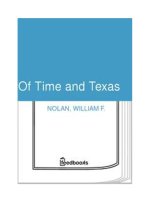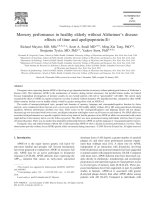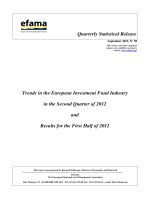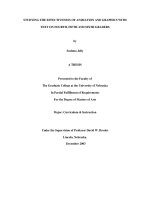ADVERBIAL CLAUSES OF TIME AND RESULTS -WITH KEY
Bạn đang xem bản rút gọn của tài liệu. Xem và tải ngay bản đầy đủ của tài liệu tại đây (105 KB, 15 trang )
ADVERBIAL CLAUSES
10. A. ADVERBIAL CLAUSE OF TIME
1. I will call you before I ________ over.
A. come B. will come C. will be coming
D. came
2. After she graduates, she ________ a job.
A. got B. will get C. had got
D. get
3. When I _________ him tomorrow, I will ask him.
A. saw B. have seen C. will see
D. see
4. As soon as it _________ raining, we will leave.
A. stops B. stop C. had stopped D.
stopped
5. By the time he comes, we will have already __________.
A. leave B. leaving C. left
D. leaves
6. Whenever I ________ her, I say hello.
A. see B. will see C. will have seen
D. saw
7. The next time I go to New York, I am going ________ a ballet.
A. seeing B. see C. saw
D. to see
8. I will never speak to him again so long as I _______.
A. lives B. will live C. am living
D. live
9. By the time Bill ____ to bed tomorrow, he will have had a full
day and will be ready for sleep.
A. had gone B. will go C. goes
D. went
10. As soon as I finish my report, I will call you and we
________ out for dinner.
A. went B. will go C. will have gone D.
go
11. By the time I return to my country, I _________ away from
home for more than three years.
A. would be B. will have been C. will be
D. am
12. After he _______ breakfast tomorrow, he will get ready to go
to work.
A. will have had B. has C. will be having
D. have
13. As soon as he finishes dinner, he _______ the children for a
work to a nearby playground.
A. will take B. takes C. will be taking D.
took
14. When Bill gets home, his children ___________ in the yard.
A. played B. will play C. will be playing D.
play
15. He will work at his desk until he ______ to another meeting
in the middle of the afternoon.
A. went B. go C. will go D.
goes
16. She ________ lunch by the time we arrived.
A. finished B. has finished C. had finished D.
finishing
17. Bob will come soon. When Bob _______, we will see him.
A. come B. will come C. will be coming
D. comes
18. I will get home at 5:30. After I get home, I ________ dinner.
A. will have B. will be having C. had
D. have
19. As soon as the taxi _________, we will be able to leave for
the airport.
A. arrives B. arrive C. will arrive
D. arrived
20. I will go to bed after I _________my work.
A. finish B. finished C. will finish
D. finishes
21. I ________ here when you arrive tomorrow.
A. am B. had been C. could be
D. will be
22. I am going to wait right here until Jessica ________.
A. comes B. will have come C. is coming
D. came
23. As soon as the war ________over, there will be great joy
throughout the land.
A. are B. will be C. is
D. would be
24. Right now the tide is low, but when the tide comes in, the ship
______ the harbor.
A. left B. will leave C. will have
left D. leave
25. I am going to start making dinner before my wife ______
home from work today.
A. get B. gets C. will get
D. got
Identify the underlined part that needs correction :
26. When it raining, I usually go to school by bus.
A B C D
27. I learned a lot of Japanese while I am in Tokyo.
A B C D
28. I have not been well since I return home.
A B C D
29. I’ll stay here until will you get back.
A B C D
30. When Sam was in New York, he stays with his cousins.
A B C D
31. Last night, I had gone to bed after I had finished my homework.
A B C D
32. I will call you before I will come over.
A B C D
33. Ever since I was a child, I had been afraid of dogs.
A B C D
34. By the time I left my apartment this morning, someone looked
for me.
A B C D
35. Whenever Mark will be angry, his nose gets red.
A B C D
36. I had fried chicken when I am at the restaurant.
A B C D
37. The first time that I went to New York, I go to an opera.
A B C D
38. Before I arrived, he was talking on the phone.
A B C D
39. When she will see him tomorrow, she will ask him.
A B C D
40. As I was walking home, it begin to rain.
A B C D
41. We stayed there after we finished our work.
A B C D
42. Once it will stop raining, we will leave.
A B C D
43. I will never speak to him again as long as I will live.
A B C D
44. As soon as the other passengers gets on the bus, we’ll leave.
A B C D
45. As soon as I will finish my report, I’ll call you and we’ll go out
to dinner.
A B C
D
46. Mark was listening to music after his sister was reading a book.
A B C D
47. Sam hadn’t received the parcel when I speak to him.
A B C D
48. I have been hoping to meet you before I read your first novel.
A B C D
49. By the time you finishes getting ready, we will have missed the
train.
A B C D
50. When you will arrive, there will be someone to meet.
A B C D
KEY TO ADVERBIAL CLAUSE OF TIME
1. A 2. B 3. D 4. A 5. C 6. A 7. D 8. D 9. C 10.
B
11.
B
12.
B
13.
A
14.
C
15.
D
16.
C
17.
D
18.
A
19.
A
20.
A
21.
D
22.
A
23.
C
24.
B
25.
B
26.
B
27.
D
28.
C
29.
D
30.
C
31.
B
32.
D
33.
C
34.
D
35.
B
36.
C
37.
C
38.
A
39.
A
40.
C
41.
C
42.
B
43.
D
44.
B
45.
B
46.
B
47.
C
48.
C
49.
B
50.
B
B. ADVERBIAL CLAUSE OF RESULT
I. Mark the letter A, B, C or D to indicate the correct option to fill
each of the following blanks.
1. Our seats were _____ far from the stage that we couldn't see the
actors and actresses clearly.
A. very B. too C. enough D.
so
2. He was _____ he never washed his clothes by himself.
A. too lazy B. so lazy that C. very lazy that D. such
lazy that
3. They are _____ young _____ drive the car.
A. so / that B. too / to C. enough / to D. not only /
but also
4. It was _____ a boring speech that I felt asleep.
A. such B. so C. very D. too
5. Is there _____ for everyone?
A. food and drink enough B. enough
food and drink
C. enough of food and drink D. enough food and
drink enough
6. He was _____ he could not continue to work.
A. very tired that B. such tired that C. too tired that D. so
tired that
7. John’s eyes were _____ bad that he couldn’t read the number
plate of the car in front.
A. such B. too C. so D.
very
8. - Why don’t we make a fire? - It’s not cold _____ to make a fire.
A. too B. enough C. such D.
much
9. Most of the pupils are _____ to pass the examination.
A. enough good B. good enough C. too good D. very
good
10. You can send me a letter if you want to, but your phone call is
_____ for me.
A. enough good B. good as enough C. good enough
D. good than enough
11. Davis has _____ many patients _____ he is always busy.
A. too / that B. very / until C. such / that D.
so / that
12. It was _____ a difficult question that they couldn't explain.
A. so B. such C. very D. too
13. The lesson _____ for me to understand.
A. is very difficult B. too difficult C. difficult too D.
is too difficult
14. The tent show is _____ for us to see.
A. enough interesting B. very interesting
C. interesting enough D. interesting
15. They are _____ that they can't buy a bicycle.
A. enough poor B. poor enough C. so poor D. too
poor
II. Mark the letter A, B, C or D to show the underlined part that
needs correction.
1. These televisions are all too expensive for we to buy at this time.
A B C D
2. Mi has such many things to do that she has no time to go out.
A B C D
3. My brother is too young not to do volunteer work .
A B C D
4. These televisions were so expensive for us to buy at that time.
A B C D
5. That is such an interested story that everybody would like to read
it.
A B C D
6. The road is very slippery for us to drive fast.
A B C D
7. The woman was so surprised that she couldn’t say nothing.
A B C D
8. She had so many luggage that there was not enough room in the
car for it.
A B C
D
9. He had so a difficult exercise that he couldn't do it.
A B C D
10. John had so interesting and creative plans that everyone wanted
to work with him.
A B C
D
III. Mark the letter A, B, C or D to indicate the sentence which is
closest in meaning to the given one
1. We couldn’t go out because the weather was so bad.
A. It was so bad a weather that we couldn’t go out.
B. It was such a bad weather that we couldn’t go out.
C. It was so bad weather that we couldn’t go out.
D. It was such bad weather that we couldn’t go out.
2. She was so busy that she couldn’t answer the phone.
A. She was very busy that she couldn’t answer the phone.
B. She was too busy to answer the phone.
C. She was too busy not to answer the phone.
D. She was very busy so that she couldn’t answer the phone
3. The coffee was too hot for me to drink.
A. The coffee is so hot that I can’t drink it
B. The coffee is so hot that I can’t drink.
C. The coffee was so hot that I couldn’t drink it.
D. The coffee was so hot that I could drink it.
4. If I were taller, I could reach the top shelf.
A. I am not tall enough to reach the top shelf.
B. I am too tall to reach the top shelf.
C. I cannot reach the top shelf because I am very tall.
D. In spite of being tall, I cannot reach the top shelf.
5. It was such a boring speech that we began to yawn.
A. The speech was very boring that we began to yawn.
B. It was so a boring speech that we began to yawn.
C. The speech was too boring that we began to yawn.
D. The speech was so boring that we began to yawn.
6. It was so late that nothing could be done.
A. It was too late for nothing to be done.
B. It was too late for anything to be done.
C. It was such late that nothing could be done.
D. It was so late that nothing to be done.
7. This is the first time I have lived in such a friendly neighborhood.
A. I have lived in such a friendly neighborhood before.
B. I haven’t lived in such a friendly neighborhood before.
C. I had lived in such a friendly neighborhood before.
D. I hadn’t lived in such a friendly neighborhood before.
8 The test was so difficult that we couldn’t finish it in two hours.
A. It was such a difficult test that we couldn’t finish it in
two hours.
B. The test was too difficult for us to finish it in two hours.
C. The test was not difficult enough for us to finish in two
hours.
D. The test was too difficult for us to finish it in two hour.
9. The book was so good that I couldn’t put it down.
A. It was so a good book that I couldn’t put it down.
B. It was such a good book that I couldn’t put it down.
C. The book was so good for me to put it down.
D. The book was so good that I couldn’t put down.
10. Sue is too slow to understand what you might say.
A. Sue is not enough quick to understand what you might say.
B. What you might say, Sue can understand slowly.
C. Sue is so slow to understand what you might say.
D. So slow is Sue that she can
’
t understand what you might
say.
IV. Sentence transformation
1. The boy can’t wear the shirt because it’s very tight.
The shirt is so…………………………………….
The shirt is too…………………………………….
2. This problem is very difficult. He can’t solve it.
The problem is too……………………………
It is such ……………………………………
3. The man was not able to go on an expedition to the Middle East
because of his age.
The man was too
……………………………………………………………
4. Hoa is very sick. She can’t sit up.
Hoa is so……………………….
5. It was very dark, so she couldn’t go out.
It was too…………………………….
6. That car was too old for me to buy.
That car was so……………………
7. The movie was so funny that we couldn’t stop laughing.
It was such……………………………………………
8. No one could move the piano. It was very heavy.
The piano was too ……………………………
9. We shouldn’t swim in this river. The water isn’t clean.
This river isn’t ………………………………………
10. John couldn’t get to sleep last night. He was worried about
exam.
John was
so………………………………………………………
11. It was a good book. I couldn’t put it down.
It was
such………………………………………………………
12. They were beautiful flowers. We took a photograph of them.
They
were……………………………………………………
13. She speaks English well. You would think it was her native
language.
She
speaks……………………………………………………………
14. A taxi would have been best. But I didn’t have enough money.
I didn’t
have………………………………………………….
15. All my guests will need chairs. But I haven’t got very many.
I didn’t
have………………………………………………….
KEY TO ADVERBIAL CLAUSE OF RESULT
I.
1.D 2. B 3. B 4. A 5. B 6. D 7. C 8. B 9. B 10. C
11. D 12. B 13. D 14. 15. 11. 12. B 13. 14. 15. C
C C D D C
II.
1. C 2. A 3. C 4. B 5. B 6. A 7. D 8. A 9. B 10. A
III.
1. D 2. B 3. C 4. A 5. D 6. B 7. B 8. A 9. B 10. D
IV.
1. The shirt is so tight that the boy can’t wear it
The shirt is too tight for the boy to wear.
2. The problem is too difficult for him to solve.
It is such a difficult problem that he can’t solve it
3. The man was too old to go on an expedition to the Middle East.
4. Hoa is so sick that he can’t sit up.
5. It was too dark for her to go out.
6 That car was so old that I couldn’t buy it.
7. It was such a funny movie that we couldn’t stop laughing.
8. The piano was too heavy to move.
9. The river isn’t clean enough for us to swim in.
10. John was so worried about the exam that he couldn’t get to sleep
last night.
11. It was such a good book that I couldn’t put it down.
12. They were such beautiful flowers that we took a photograph of
them.
13. She speaks English so well that you would think it was her
native language.
14. I didn’t have enough money for a taxi.
15. I didn’t have enough chairs for all my guests.









